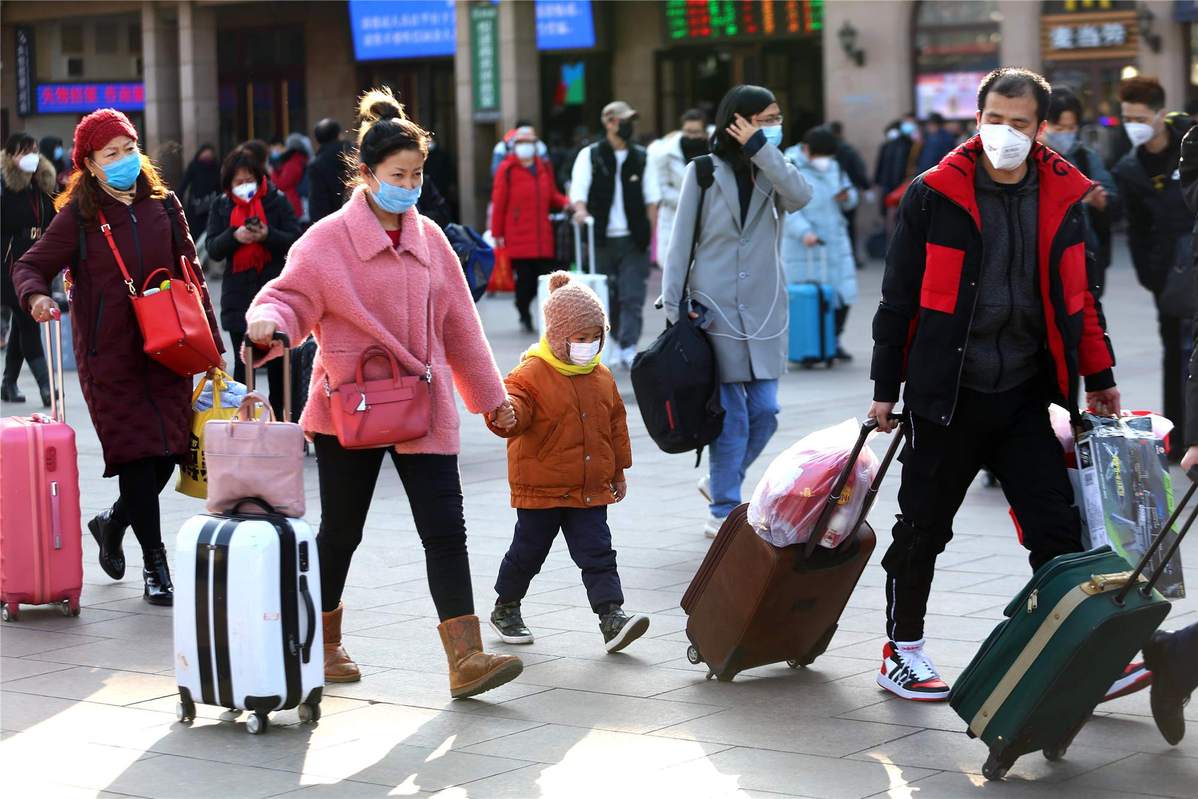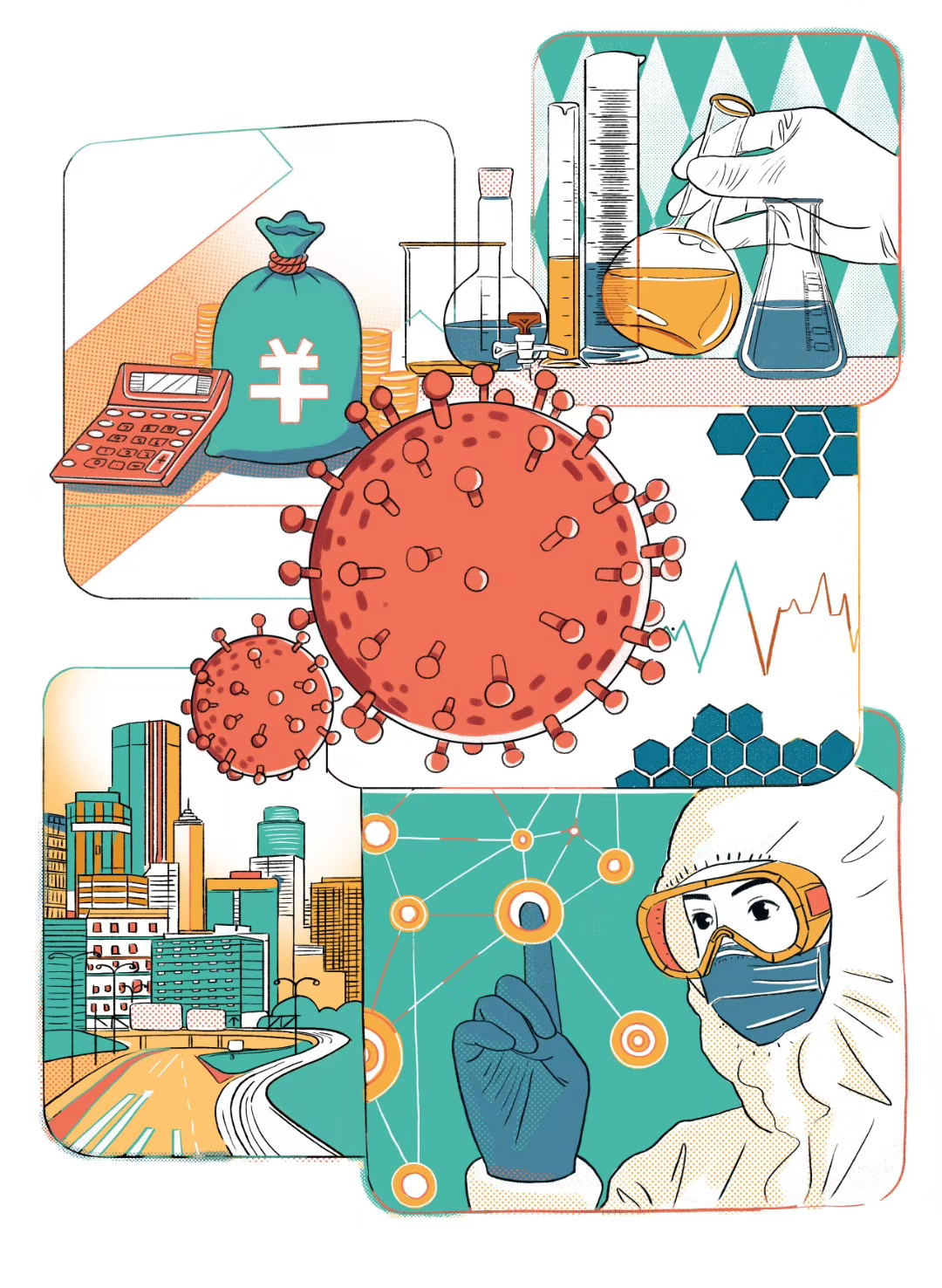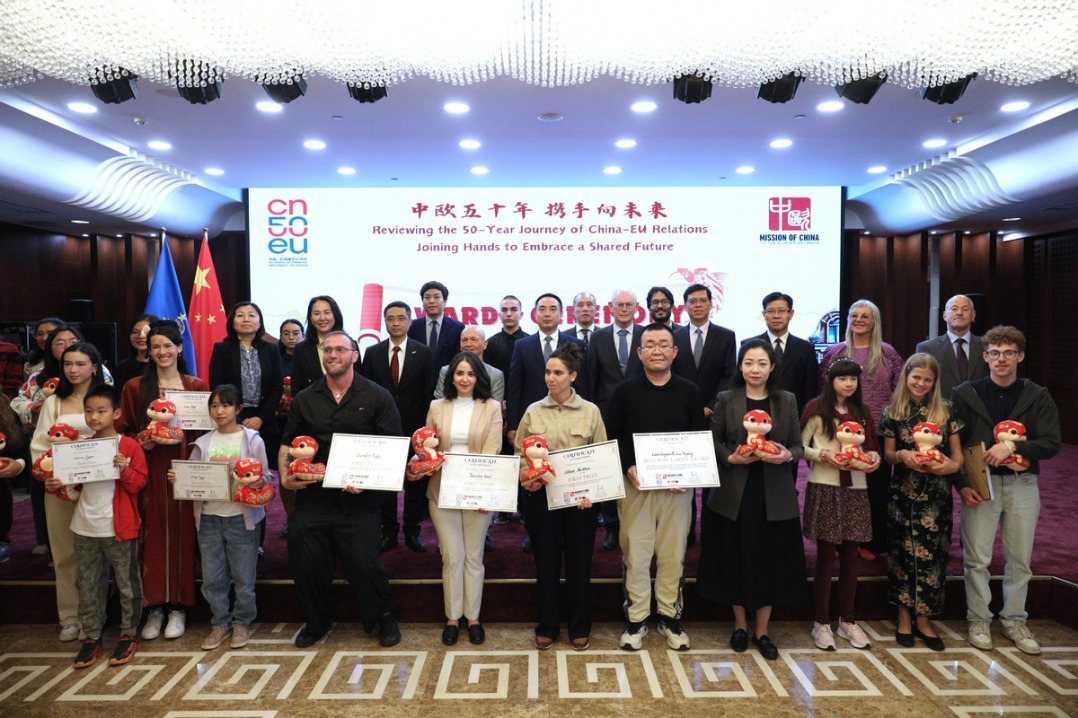2020年2月新闻热词汇总
中国日报网 2020-03-01 10:00

交叉感染 cross infection
交通运输部运输服务司副司长蔡团结2月6日在国务院联防联控机制新闻发布会上说,针对返程大客流,交通运输部有针对性地研究相关保障方案,坚决防止疫情通过交通运输工具传播,降低客流输入地区的输入性风险。

To contain virus infections during the trips, railways, airports and other public transportation operators have intensified disinfection, ventilation and sanitation of vehicles and stations.
为了防止病毒传播,铁路、民航以及其他交通运输部门均加强了交通运输工具和场站的消毒、通风和卫生清洁。
Passengers will go through body temperature screening at both entrances and exits of operating public transportation stations across the country. People found to have caught a fever above 37.3 degrees Celsius will be transferred to health departments.
乘客进出客运场站均需测温,如果发现有乘客体温超过37.3度,第一时间移交卫生健康部门。
Meanwhile, steps have been taken to make sure vehicles are not fully booked to allow a safe distance between passengers, Cai said, adding that temporary isolation areas had been set in the vehicles to avoid cross-infections in case of emergency during the journey.
同时,控制交通运输工具客座率,确保乘客之间有一定安全距离,此外,预留一部分空间作为突发情况时的暂时隔离区域。
【知识点】
这里的“客座率”在英语中有一个专门的表述passenger load factor(PLF),是交通运输工具全程座位使用情况的一个测算指标,指特定时间段内,购票乘客数在某个交通运输工具全部可用座位总数中所占的比例。
铁路部门在售票源头上加强管控,控制旅客列车的客座率,近几天售票会把旅客列车的客座率控制在50%左右(make sure that train passenger load factor is around 50%),并实行分散售票,列车工作人员在旅客上车以后会引导大家分散就座。
此外,北京地铁非配合式热成像体温测试系统布设车站已增至35座。
Compared with hand-held instruments, the thermal imaging system can automatically measure passengers' temperature, improving passenger flow at subway stations.
与手持型测温设备相比,热成像系统能够自动检测乘客体温,缩短地铁站乘客等待时间。
The thermal imaging system can issue an alert when detecting passengers with abnormal body temperatures and monitor the temperatures continuously, according to Beijing Mass Transit Railway Operation Corporation Ltd.
据北京地铁运营有限公司介绍,热成像系统发现体温异常的乘客后,会对其体温持续进行监测。
气溶胶传播 aerosol transmission
The novel coronavirus normally does not suspend or float in the air for long, and currently no evidence has shown that the new virus can be transmitted through aerosol, Feng Luzhao, a researcher of infectious diseases with the Chinese Center for Disease Control and Prevention, said at the press conference.
中国疾病预防控制中心传染病预防控制处研究员冯录召表示,新型冠状病毒一般不会在空气长期漂浮,目前没有证据显示新型冠状病毒通过气溶胶传播。
【知识点】
气溶胶传播(aerosol transmission,aerosol读作['erə.sɑl]),是指飞沫在空气悬浮过程中失去水分而剩下的蛋白质(protein)和病原体(pathogen)组成的核,形成飞沫核(droplet nuclei),可以通过气溶胶的形式漂浮至远处,造成远距离的传播(float for a long distance and spread the virus)。
Currently, the virus is mainly transmitted via respiratory droplets and contact, said Feng, adding that the virus is normally transmitted within a range of one to two meters.
冯录召说,新型冠状病毒主要通过呼吸道飞沫传播和接触传播,而飞沫传播距离很短,一般1至2米。
He suggested the public to open windows to help with ventilation at least twice a day, which is effective to lower the risks of getting infected.
他建议每天至少两次开窗通风,这是降低感染风险的有效措施。
他表示,在一般的工作生活条件下,采取正确佩戴口罩的飞沫传播防护措施,是足以满足保护普通公众不被感染的(wearing a mask correctly is enough to protect the general public from the virus)。
农产品附着病毒几率很低
冯录召表示,病毒通过飞沫、直接接触等方式污染到蔬菜、肉和水果的几率很低。
He suggested that raw vegetables, meats and fruits should be washed with running water, in the meantime, people should only eat cooked vegetables and meats and fruits without peels.
他建议,蔬菜、肉、水果买回家后需先用流水清洗。蔬菜、肉类不要生食,需炒熟吃,水果尽量削皮。
The virus would die in 30 minutes at a temperature of 56 degrees Celsius, Feng said, adding that cooking temperatures usually reach 100 degrees Celsius or even higher.
冯录召说,病毒在温度56℃状态下,30分钟内就能被杀死,而炒菜等温度能达到100℃甚至更高。
Feng urged people to wash their hands more frequently, especially after dealing with these agricultural products. He also advised people to use different kitchen wares, like cutting boards and knives, for raw and cooked food, respectively.
处理蔬菜、肉类、水果后要及时洗手。处理生食和熟食的切菜板及刀具要分开。
假阴性 false nagetive results
Reports that nucleic acid tests have returned false-negative results for people infected with the novel coronavirus have prompted medical workers to deploy multiple measures to identify infections and implement rigorous isolation measures amid the viral epidemic.
一些新型冠状病毒感染者的核酸检测结果出现“假阴性”,这类报告促使医护人员采取多重措施确诊感染者,并采取更加严格的隔离措施来防控疫情。
据《新京报》报道,一位武汉来京的发热肺炎患者2月5日在中日医院呼吸四部确诊为新型冠状病毒感染肺炎。
An infected patient in Beijing tested negative three times for the virus through routine throat swab nucleic acid tests. The case was eventually confirmed by extracting samples from the lower respiratory tract — a more intrusive procedure.
此例患者入院前三次咽拭子新冠病毒核酸检测均为阴性,入院后从下呼吸道提取样本检测才发现新冠病毒核酸阳性。
公开资料显示,除中日医院这名“假阴性”患者外,浙江、宁夏、福建、天津已出现多例核酸检测“假阴性”病例。
针对这一情况,2月9日,国务院联防联控机制新闻发布会称,任何病毒的核酸检测结果都不可能是100%阳性,对新冠病毒的核酸检测也不例外,“假阴性”在所难免。
Gao Zhancheng, head of the respiratory and critical care department at Peking University's People's Hospital, said a range of factors will impact the accuracy of nucleic acid testing, including the severity of symptoms, the illness' development, the extraction method and the circumstances at laboratories.
北京大学人民医院呼吸与危重症医学科主任高占成说,核酸检测结果也受患者病情轻重、疾病不同阶段、取样方式方法、实验室检测条件影响。
"Nucleic acid testing targeting other viruses also cannot ensure full accuracy. However, such testing remains an irreplaceable way to confirm infection," he told a news conference held by the State Council's Joint Prevention and Control Mechanism on Sunday.
“任何病毒的核酸检测结果都不可能是100%阳性,但对于确诊新冠肺炎,核酸检测是不可或缺的手段。”高占成在9日的国务院联防联控机制新闻发布会上说。
"Under the current treatment guideline, suspected cases who have tested negative for the virus once are also required to be quarantined at designated facilities for strict observation."
“初次检测阴性的疑似患者,按照现行国家卫健委诊疗方案要求,还需在定点医院隔离观察。”
对于假阴性是否会导致漏诊的问题,专家们表示,不必过分担心,病例的确诊和排除,除了核酸检测,还将结合流行病学史( epidemiological records)、临床症状(clinical symptoms)、CT影像( CT scan imaging)等判断。
新冠肺炎 COVID-19
2月11日,世界卫生组织总干事谭德塞宣布,将新型冠状病毒感染的肺炎命名为“COVID-19”。
"We now have a name for the disease and it's COVID-19," WHO chief Tedros Adhanom Ghebreyesus told reporters in Geneva.
在日内瓦,世界卫生组织总干事谭德塞对记者表示:“我们将这个疾病命名为COVID-19。”
这个名字COVID-19来源于corona(冠状)、virus(病毒)以及disease(疾病)三个词,而19则代表这个疾病出现的年份2019年。新冠肺炎疫情是在2019年12月31日上报至世界卫生组织的。

谭德塞指出:
"We had to find a name that did not refer to a geographical location, an animal, an individual or group of people, and which is also pronounceable and related to the disease," the WHO chief said.
我们要取的名字不能指向某个地理位置、某个动物、某个人或群体,同时这个名字要易读,且与该疾病相关。
"Having a name matters to prevent the use of other names that can be inaccurate or stigmatizing. It also gives us a standard format to use for any future coronavirus outbreaks."
正式命名可以阻止其他不准确或者污名化名称的使用,同时,也让我们在今后的冠状病毒疫情命名时有标准可循。
新型冠状病毒名称为SARS-CoV-2
The virus itself has been designated SARS-CoV-2 by the International Committee on Taxonomy of Viruses.
新型冠状病毒的名称则由国际病毒分类委员会指定为SARS-CoV-2。
冠状病毒(coronavirus)是一个病毒大家族,其中包括引起普通感冒的病毒,以及曾经造成重大疫情的:
► 严重急性呼吸综合征(Severe Acute Respiratory Syndrome,SARS)冠状病毒;
► 中东呼吸综合征(Middle East Respiratory Syndrome,MERS)冠状病毒。
此前,世界卫生组织建议使用的临时名称,英文叫“2019-nCoV”。2019指代病毒被发现的年份,后面的nCoV是“新型冠状病毒”英文翻译new/novel coronavirus的缩写。
为什么给病毒起名讲究这么多?
美国约翰斯·霍普金斯健康安全中心高级学者、助理教授克丽丝特尔·沃森(Crystal Watson, senior scholar and assistant professor at the Johns Hopkins Center for Health Security)表示虽然当下焦点都放在了公共卫生应对上,不过病毒命名工作也值得优先处理。
"The naming of a new virus is often quite delayed and the focus until now has been on the public health response, which is understandable."
“给新病毒的命名通常都会滞后许多,而且到目前为止,焦点都放在公共卫生应对上,这是可以理解的。”
"But there are reasons the naming should be a priority."
“但是,病毒命名工作应该优先处理,是有原因的。”
她给出了几点原因:
❶ "The name it has now is not easy to use and the media and the public are using other names for the virus," says Dr Watson.
“目前的病毒名称用起来并不方便,而媒体和公众都在使用病毒的别名。”
❷ "The danger when you don't have an official name is that people start using terms like China Virus, and that can create a backlash against certain populations."
“没有正式名称的危险在于,人们开始使用诸如‘中国病毒’等表述,这会导致人们对部分特定人群产生强烈抵制。”
❸ With social media, unofficial names take hold quickly and are hard to take back, she says.
她说,非官方的名称很容易在社交媒体上迅速流行起来,这很难撤回。
其实,给病毒起名不慎,早已有前车之鉴。
The H1N1 virus in 2009 was dubbed "swine flu". This led Egypt to slaughter all of its pigs, even though it was spread by people, not pigs.
2009年的甲型H1N1流感病毒曾另被称作“猪流感”,结果导致埃及屠宰了境内全部的猪。但其实这种流感病毒是由人传播,而不是猪传播。
正式名称不合适也可能引发各种潜在问题。
世界卫生组织就曾在2015年批评过“中东呼吸综合征” (MERS:Middle East Respiratory Syndrome)这一名称。
命名中含有地区信息,这就可能招致不必要的地域歧视。毕竟病毒只是在这一地区偶然发现的,没人能够证明世界上其他地方就不存在该病毒。
世卫组织在一篇声明中说道:
"We've seen certain disease names provoke a backlash against members of particular religious or ethnic communities, create unjustified barriers to travel, commerce and trade, and trigger needless slaughtering of food animals."
“我们注意到某些疾病的名称煽动起了对特定宗教或是族裔成员的抵制,对旅行、商业和贸易造成不正当的障碍,并且引发了对食用动物不必要的屠杀。”
2015年,世卫组织发布了命名新型人类传染病的指导原则,要求名称中不能包含以下信息:
◆ 地理位置
geographical locations
◆ 人名
people's names
◆ 动物或食物的名字
the name of an animal or a kind of food
◆ 指向特定文化或行业
references to a particular culture or industry
临床诊断病例 clinically diagnosed cases
Hubei province reported 14,840 new cases of novel coronavirus pneumonia on Wednesday, compared to 1,638 new cases reported on Tuesday, according to the province’s health commission on Thursday morning.
湖北省卫健委2月13日早晨发布的数据显示,2月12日,该省新增新冠肺炎病例14840例,而2月11日,湖北省的新增病例为1638例。
通报显示,湖北省新增新冠肺炎病例14840例(含临床诊断病例13332例)。

什么是临床诊断病例(clinically diagnosed cases)?为什么要新增临床诊断病例?
In a statement released on Thursday morning, the commission said it now considers patients who are clinically diagnosed as having the novel coronavirus disease as confirmed patients when releasing the figures. Previously only patients testing positive for the virus were regarded as confirmed patients in Hubei.
湖北省卫健委在通报中表示,湖北省将临床诊断病例数纳入确诊病例数进行公布。此前,只有病毒检测为阳性的患者才能被纳入确诊患者。
随着对新型冠状病毒肺炎认识的深入和诊疗经验的积累,针对湖北省疫情特点,国家卫生健康委办公厅、国家中医药管理局办公室印发的《新型冠状病毒感染的肺炎诊疗方案(试行第五版)》在湖北省的病例诊断分类中增加了“临床诊断”,以便患者能及早按照确诊病例接受规范治疗,进一步提高救治成功率。
中央指导组专家、北京朝阳医院副院长童朝晖表示:
Revising the diagnosis standard can help doctors give a diagnosis for the disease. They can now give a diagnosis relying on a combination of factors, such as lung images, physical conditions and epidemiological history.
修订诊断标准有益于临床医生对疾病多一个判断。在临床工作中,我们从肺部影像、体征以及流行病学史等方面综合诊断。

















 英语点津微信
英语点津微信 双语小程序
双语小程序